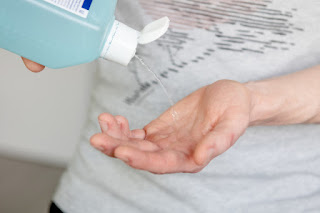Pork infection
In Germany and Europe, HEV has its natural reservoir in pigs. The infection can pass from the animals to humans, one speaks here of a zoonosis. This is often done by meat products that are not fully heated or raw, such as Mett. In tropical regions of the world, contaminated water leads to infections with sometimes larger outbreaks. "Some of these infections may have been prevented by the right hygiene measures," says Dr. Patrick Behrendt, doctor in the clinic for gastroenterology, hepatology and endocrinology at MHH and head of the junior research group "Translational Virology" at TWINCORE. This includes correct hygienic hand disinfection, especially in everyday clinical practice in dealing with hepatitis E patients and infected animals.
Together with the team of Prof. Dr. Eike Steinmann, head of the Department of Molecular and Medical Virology at RUB, examined Behrendt whether common hand disinfectants can render the virus harmless. "We tested the effects of the alcohols ethanol and propanol, both individually and in the mixing ratios recommended by the WHO, as well as commercial hand disinfectants," says Steinmann. “However, only one product that contained another component was effective."
HEV usually occurs unwashed and, like all unenveloped viruses, is very resistant to chemical influences. However, virus particles that are surrounded by a lipid shell also circulate in the blood of patients. "Not all disinfectants are effective against enveloped and unenveloped viruses at the same time," says Steinmann. “We used both forms of HEV for our exams."
Alcohol alone does not work
Although some of the tested disinfectants were certified for inactivating enveloped and unenveloped viruses, they were not sufficiently effective against HEV. "The alcoholic components dissolve the lipid shell, but the resulting naked viruses are still infectious," says Behrendt. HEV is literally difficult to get small. The decisive advantage was a product that contains phosphoric acid in addition to alcohol. This means that all virus particles have been sufficiently neutralized.
"We were able to show that HEV can withstand most common hand disinfectants," says Behrendt. “We hope that these findings will be considered in the future if hygiene measures are recommended when dealing with contaminated meat products and HEV outbreaks."
Source/Credit: Ruhr University Bochum
med020122_01








.jpg)